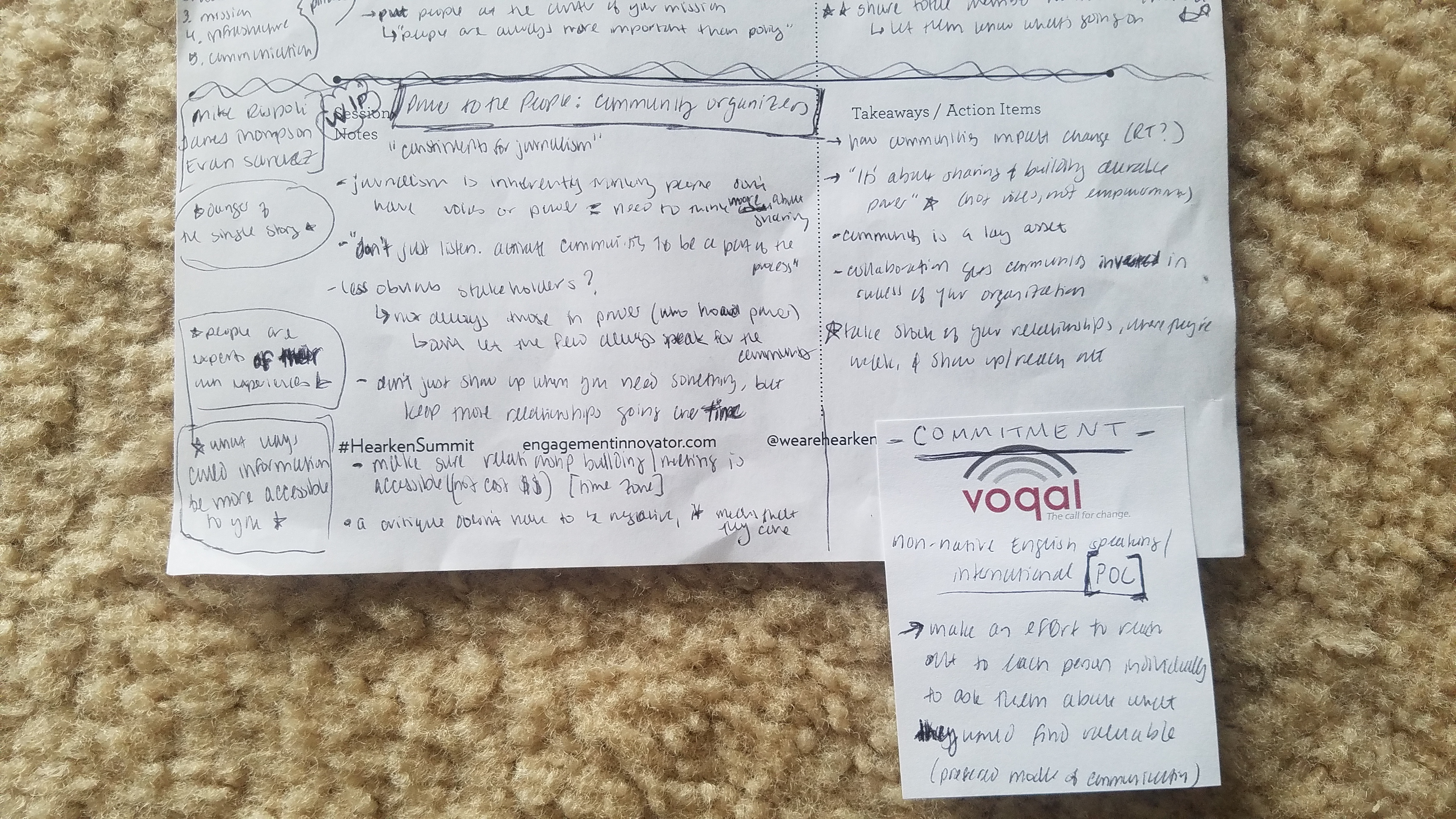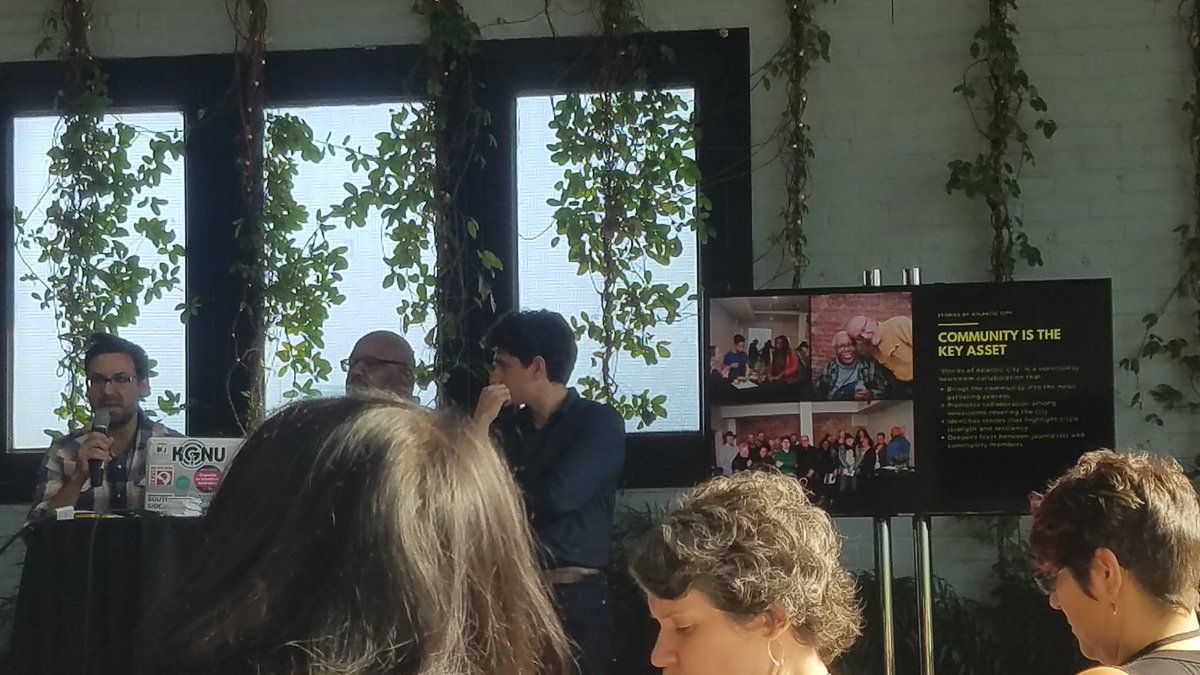On October 23 - 24, 2019, I attended Hearken's inaugural Engagement Innovation Summit in New York City. This is the second of three blog posts that I am writing to sum up some of my key takeaways from three of my top sessions. You can find the first blog post on learning from community health workers here.
-----
"Power To The People: What Journalists Can Learn From Community Organizers"

On the first day of the Hearken Engagement Innovation Summit, my morning was spent listening to speakers from the community health and religious organization spaces as they discussed listening and member-supported ventures. My afternoon started off with another one of my favorite sessions from the summit: Power to the People: What Journalists Can Learn From Community Organizers.
In my past role as a Community Engagement Editor at the hyperlocal news outlet, Jersey Shore Hurricane News, I met and collaborated with the speakers in this session, so I've actually heard these conversations before, but it resonated all the same this time around.
In this session, Mike Rispoli and James Thompson from Free Press and Evan Sanchez from Authentic City Partners discussed how you can listen, build relationships, and use community as your key asset in information sharing and affecting change. One of their key themes that really resonated with me was allowing and encouraging community to be at the heart of the journalistic process. As Mike said, "Don't just listen. Activate community to be a part of the process."
 At the heart of this session was the concept that "community is the key asset" and that we have to actively assess, manage, and develop our relationships with our communities in order to be successful.
At the heart of this session was the concept that "community is the key asset" and that we have to actively assess, manage, and develop our relationships with our communities in order to be successful.
While I felt like this entire sessions overlaps with common challenges and situations that community practitioners find themselves with, I thought the concept of making community a part of your process was the most clear and defined similarity of the summit.
The point that collaboration gets communities invested in the success of your organization was made, and that directly relates to getting members (employees and/or customers) involved in community strategy, because, if they're involved, they will be invested in the success of the program.
But, that collaboration also doesn't come easily or without work. Building and developing relationships with these people takes effort. We need to regularly take stock of relationships, notice where they're weak (both in terms of with individual people and with larger groups and demographics), and show up, reach out, and take the initiative to make them stronger. In both online and offline communities, you can't just show up and go to someone when you need something, you have to be continuously building and developing relationships over time in order to be able to collaborate.
Through the lens of Stories of Atlantic City, Mike, James, and Evan discussed how journalism and community were able to come together to tell the stories of people who wouldn't have been heard otherwise. Instead of focusing journalism on "giving voices to the voiceless" or empowering a group of people, Mike said that this work is "about sharing and building durable power". People are the experts of their own experiences, so, by giving people a chance to be heard and by bringing visibility to their perspectives, we're helping share this power and access that we have.
Many online communities also deal with creating change, whether it's internal culture change within their organization or working to change some external social aspect, this entire conversation is applicable to how community practitioners involve their members in their community strategy.
One of my main takeaways from this session was around accessibility. If you're a member of TheCR Network, you've probably heard me talking about one of my goals as making TheCR Network more accessible, and it truly is. This session was both a fantastic way to reaffirm that goal and make sure I was moving in the right direction with how I was going to fulfill it.
My goal is to not only provide more accessible means to find, consume, and leverage information within TheCR Network, but involve members in the process. I want to make sure that I don't only speak to the few, but to the many, and seek out those who aren't heard as loudly as others. I want to take stock of my own personal relationships and develop more with members I don't know as well. I want to make sure that the strategies we use to build and develop these relationships are accessible to all and we're not excluding members through time, medium, structure, language, or culture.
At the very end of the session, Mike, James, and Evan asked everyone to write down one commitment, or something that we'd check in with each other about in two weeks to see how we've progressed. Two weeks isn't a long time, but it's long enough to outline and start down the path to something specific. It can be as simple as meeting with people, presenting/pitching an idea to a stakeholder, or just asking certain people specific questions.
So, to start working toward my commitment, my question for TheCR Network members is:
What ways could information in TheCR Network be more accessible for you?
--------------------
If you're not a member of TheCR Network, you can read more about what membership entails and how to join here. If you have any questions, please feel free to reach out!